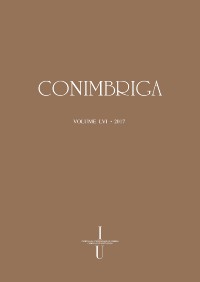Please use this identifier to cite or link to this item:
https://hdl.handle.net/10316.2/91204| Title: | Sobre algunos conjuntos epigráficos rurales del interior de la Gallaecia romana: una propuesta de interpretación | Other Titles: | On some rural epigraphic wholes from inland Roman Gallaecia: a proposal of interpretation | Authors: | Serrano Lozano, David | Keywords: | epigrafía rural;Noroeste;Gallaecia;romanización;hábito epigráfico;provincialización romana;rural epigraphy;Northwest;Gallaecia;Romanization;epigraphic habit;Roman provinzialitation | Issue Date: | 2017 | Publisher: | Imprensa da Universidade de Coimbra | Abstract: | A través de un análisis de carácter integral del registro epigráfico,
se plantea un estudio de varios conjuntos de epígrafes romanos
localizados en la mitad septentrional de Galicia, conjuntos definidos
tanto por criterios epigráficos, externos e internos, como por
su relación con el paisaje físico y epigráfico del entorno.
Estos conjuntos apuntarían a la presencia bien de horizontes epigráficos,
bien de regiones del territorio galaico-provincial con
elementos culturales comunes, y cuya interacción con el hábito
epigráfico habría dado lugar a producciones con características
propias.
Se pone en evidencia, en suma, la posibilidad de identificar sectores
rurales que habrían desarrollado modelos epigráficos con elementos
característicos, reflejo de las diversas dinámicas internas de toma de contacto y desarrollo de un elemento material aculturizante
tan crucial como fue la epigrafía latina. Through an integral analysis of epigraphic record, a study of some roman epigraphic wholes located in the northern half of Galicia is brought up, according to external and internal epigraphic criteria, as well as to the record relationship with the physic and epigraphic landscape around it. These wholes could be indicating the presence of epigraphic horizons or provincial areas with common cultural elements, whose interaction with the epigraphic habit would have led to productions with their own characteristic features. In short, the possibility of identifying rural sectors which would have developed characteristic epigraphic models is proposed, reflecting the manifold inner dynamics when getting in contact with and developing such an important acculturating material as Roman epigraphy. |
URI: | https://hdl.handle.net/10316.2/43449 | ISSN: | 1647-8657 (PDF) 0084-9189 |
DOI: | 10.14195/1647-8657_56_5 | Rights: | open access |
| Appears in Collections: | Conimbriga |
Files in This Item:
| File | Description | Size | Format | |
|---|---|---|---|---|
| sobre_algunos_conjuntos_epigraficos.pdf | 6.13 MB | Adobe PDF |  |
Items in DSpace are protected by copyright, with all rights reserved, unless otherwise indicated.
